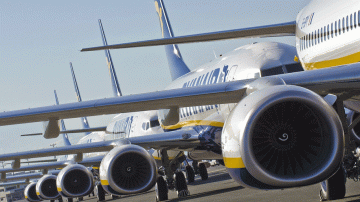
A smarter approach to business travel will be needed if aviation is to succeed in cutting its carbon emissions, says a new report.
The ‘Roadmap to Climate Neutral Aviation in Europe’ published by NGO Transport and Environment today says that the industry needs to “act urgently to prevent a rapid increase in aviation emissions post-pandemic.
It says “The two pillars to such an approach are an end to airport expansion in Europe, which has driven much of the growth in emissions, and a reduction in corporate travel to 50 per cent of pre-Covid levels.”
The NGO says that this reduction in corporate travel will be possible because of “new ways to work and stay in touch” but also encourages governments to discourage corporate travel.
“Any reduction in corporate travel will be through an interplay between voluntary commitments by businesses, and supportive measures by governments.”
The report estimates that business travel represented about 30 per cent of aviation emissions in 2019. Since a decrease in business travel might result in higher economy ticket prices (because of cross-subsidisation), economy and leisure tickets might also increase in price leading to a further drop in demand as a result of a drop in business travel.
To achieve this the Roadmap suggests “top-down” policies by governments such as limiting the use of frequent flyer programmes and / or mandating disclosure of total corporate travel emissions by companies.
Frequent fliers cause half of aviation’s passenger emissions: report
It says there could also be “bottom-up” policies adopted by major corporations to reduce their own travel. The Roadmap says that
“Corporate climate commitments must face greater scrutiny, and could be regulated to ensure that they must include emissions from corporate travel, part of “Scope 3” emissions.”
The report looks at other ways that emissions may be reduced. The role that technological and operational efficiency improvements can play is examined, though the report says that “demand-led growth has always [in the past] outstripped efficiency improvements” and believes that “This gap will only worsen as… efficiency improvements are becoming harder to achieve.”
Secondly the report calls for better pricing of aviation emissions and ending the sector’s “outrageous tax exemptions…. ”
The report says that “In 2022, there is no justification for why airlines should be allowed to buy fossil jet fuel tax free, and why the majority of Europe’s aviation emissions should be exempt from the EU’s increasingly effective carbon pricing mechanism.”
The Roadmap advocates fossil jet fuel taxation, the European Union Emissions Trading Scheme, ticket taxes and minimum pricing, and puts a necessary price of €165 per tonne of CO2 on all European aviation emissions by 2030, including flights departing from Europe not currently covered by EU ETS.
The report considers revolutionary aircraft fuelling technologies including hydrogen aircraft, but says that “new aircraft, introduced in the 2040s, will arrive too late” and calls for more government support to speed progress.
On Sustainable Aviation Fuel (SAF), the Roadmap says it must play an important role, but the nature of the feedstock for this SAF is all- important, since “Biobased alternatives either compete with food and forestry, or have limited feedstocks. More promising is the use of e-kerosene, produced from green hydrogen, with additional renewable electricity and with CO2 captured from ambient air.”
The full report can be downloaded from the Transport and Environment website.












